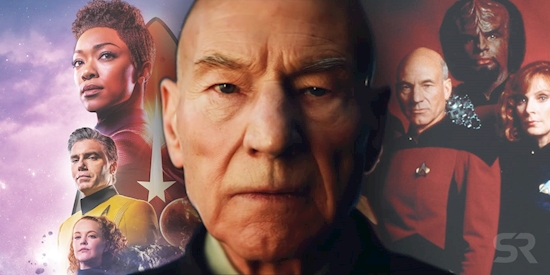Where Picard Takes Place In The Star Trek Timeline
Star Trek: Picard's timeline will take the venerable science fiction franchise where it truly has never gone before - the end of the 24th century. To date, no Star Trek series or film has been set primarily in a year past 2379, which saw the events of the final Star Trek: The Next Generation film, Star Trek: Nemesis. Picard will begin its story in 2399, twenty years after we last glimpsed Captain Jean-Luc Picard on the bridge of the Enterprise.
Most Star Trek series take place in either the 23rd or 24th century - far enough into the future to justify wild technological advances while still keeping the everyday lives and feelings of the characters recognizably human. Star Trek: The Original Series took place in the 2260s, with The Next Generation picking up about a century later. Star Trek: Deep Space Nine and Star Trek: Voyager took place in the same time period as TNG; the last series before the franchise's forced hiatus, Star Trek: Enterprise, took place a century before TOS, chronicling the earliest days of humanity's exploration of the galaxy. CBS's current iteration, Star Trek: Discovery, takes place about a decade before the original adventures of Kirk and Spock.
Click the button below to start this article in quick view. Start nowThe J.J. Abrams-produced Star Trek movies technically take place in an alternate timeline created when Spock and a Romulan mining vessel were pulled into the past from 2387; that date is important, as it's the latest chronological year where we know anything concrete that happened in Star Trek's Prime timeline, namely, the destruction of Romulus. Producer Alex Kurtzman has hinted the demise of the Romulan Empire will figure heavily into the plot of Picard.
Beyond the obvious thrill of seeing Patrick Stewart play Jean-Luc Picard again, Picard is an important moment in Star Trek history or another reason - it's the first Star Trek project in 17 years that will move the overall timeline forward; the Abrams films are set in a parallel 23rd century - dubbed the Kelvin timeline - and Discovery is just a bit before TOS. Both Discovery and the Abrams films are quality entertainment - Discovery had some brushes with greatness in its much improved second season - but they rely on nostalgia and the classic iconography of the franchise in a way that would have been anathema to the Star Trek braintrust - Michael Piller, Rick Berman, Ira Steven Behr - during the peak of its popularity in the 90s. Star Trek, by its very nature, is about moving forward, about finding out what's next. It's a great irony that the franchise has spent the majority of the past two decades looking backwards.
But that all ends with Star Trek: Picard. Longtime fans suddenly have the opportunity to have long lingering questions answered, everything from the results of the bloody Cardassian revolution seen at the end of Deep Space Nine or the fate of B-4 after he was given the late Data's memories in Nemesis. There's no guarantee we'll get any answers to those questions - Kurtzman has spoken of Picard as being unlike any other Trek show, explaining it will be a much more meditative, psychological show than the occasionally frantic Star Trek: Discovery. That sounds like a great opportunity for Patrick Stewart to show off his Galaxy-class acting chops, but maybe not the right setting to hash out two decades of intergalactic political wrangling. But whatever Star Trek: Picard has to offer its audience, one thing is for sure - it'll be something new.
Source: screenrant.com

